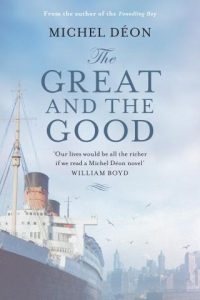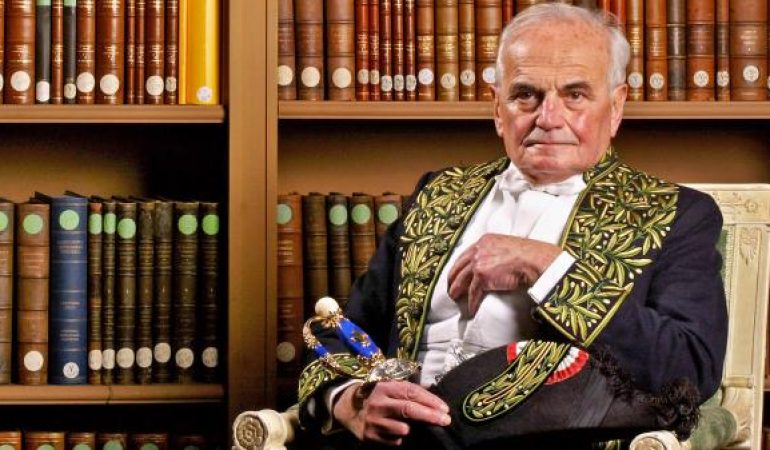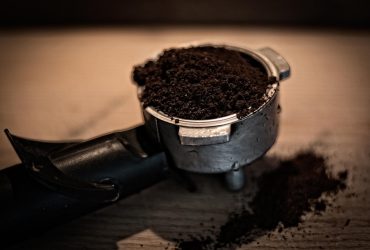The Great and the Good by Michel Déon
 When Michel Déon’s sprawling, picaresque novel The Foundling Boy appeared in English in 2013, critics scurried to outdo each other in its praise. Comparisons to Flaubert and Fielding were bandied about and fingers were wagged at the English reading public. How typical of your insular national culture that a man hailed as an “immortal” by the Académie française is living right under your noses — in Ireland, for heaven’s sakes — and none of you has bothered to read his books!
When Michel Déon’s sprawling, picaresque novel The Foundling Boy appeared in English in 2013, critics scurried to outdo each other in its praise. Comparisons to Flaubert and Fielding were bandied about and fingers were wagged at the English reading public. How typical of your insular national culture that a man hailed as an “immortal” by the Académie française is living right under your noses — in Ireland, for heaven’s sakes — and none of you has bothered to read his books!
Déon, who died just before the new year at the age of 97, was a French literary institution, and an extraordinary link to the country’s postwar cultural scene. He published his first book in the year France was liberated from the Nazis and spent his youth hanging out with everyone from William Faulkner and Jean Cocteau to Coco Chanel and Salvador Dalí. He discovered Françoise Sagan’s Bonjour Tristesse, one of the most famous novels of that era. On top of that, he found time to publish more than 50 books and win about every literary trophy France has to offer.
On the basis of what has been published in English, however, I’m waiting to be convinced that Déon-mania will hit Britain. Certainly Déon hasn’t yet spawned the Ferrante-esque phenomenon some of The Foundling Boy’s wilder reviews seemed to predict. Perhaps in an attempt to gee things up a bit, Gallic has translated another Déon novel, The Great and the Good, which was published in France in 1996. Nobody likes to be left behind by a burgeoning literary trend — least of all reviewers — and I wanted badly to like this sally.
The novel opens with all the machinery of a promising Bildungsroman in place. The year is 1955 and Arthur Morgan, a talented if slightly gauche young Frenchman, has just boarded the steamship that will carry him across the Atlantic to take up a scholarship at the prestigious Beresford (read Harvard) University. Doting maman has splurged her meagre savings on an expensive suite, which means he is able to mix with the hoity-toity crowd in first class.
At dinner Arthur is struck by two young women: Elizabeth (sexy and outrageous) and Augusta (sexy and mysterious). Also along for the ride is Augusta’s shady, financially incontinent brother, Getulio. Arthur digs sexy/mysterious more than sexy/outrageous and is soon head over heels in love with Augusta. Fortunately for him she does a good line in sexy/outrageous too. In one of the book’s rather limp voyeuristic climaxes she signals her attraction to Arthur by coyly lifting her bedclothes to show him her naked bottom.
The voyage is almost as good for Arthur’s career as it is for his libido. On board he befriends the drunken but brilliant Beresford academic Professor Concannon and one Allen Dwight Porter, an important figure in the US government.
At Beresford it quickly transpires that dastardly Getulio is determined to destroy Arthur and Augusta’s fledgling romance. He wants his sister married to a rich investor, not some impoverished French scholarship boy. It’s not all gloom, though. The mysterious Porter has taken a shine to Arthur and parachutes him into a plum internship with an investment bank in New York.
In one frankly weird scene, apparently conceived as a satire of avant-garde excess, Elizabeth cheerfully shags a well-hung actor on stage as part of an “experimental” theatre performance. This is all a bit much for stolid provincial Arthur and he takes advantage of Getulio’s temporary absence to sweep Augusta away for one last blissful holiday in Florida. When he returns to New York he has no idea whether he’ll manage to see her again.
As much as I willed The Great and the Good to succeed, it never quite takes off. Whereas The Foundling Boy was a mad, view-halloo dash of picaresque mayhem, this book is characterised by a sort of dissipated, fidgety energy. Every time Déon introduces a new character or a plot twist he starts casting anxiously around for someone better to talk to, or some fresh event more diverting than the last. It makes for an ultimately unsatisfying experience, like drinking a cappuccino made entirely of froth.
The Great and the Good by Michel Déon, Gallic, 288pp, £8.99




